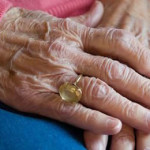Why Does Rheumatoid Arthritis Hurt More at Night?
The symptoms of rheumatoid arthritis (RA) can be chronic, or may come and go. The more flares you have, the greater risk of developing joint damage which then may end with disability. Interestingly, some sufferers find that the disease hurt more at night, why?
Experts are generally interested in the pattern of how the RA symptoms come and go. This may provide a helpful clue to control the disease better.
 But there is no single pattern. The periodicity of RA symptoms varies from patient to patient. But many times, the inflammatory arthritis such as RA is more likely to get worse in the morning and late in the evening.
But there is no single pattern. The periodicity of RA symptoms varies from patient to patient. But many times, the inflammatory arthritis such as RA is more likely to get worse in the morning and late in the evening.
The pain and other discomfort symptoms may interrupt the sleep cycle of patients. If you have this inflammatory arthritis, frequently, you may be woken up by night pain in the affected joint.
And while RA can cause sleep deprivation and affect the quality of your sleep, the disease can get worse when your body don’t get adequate sleep. For instance, poor sleep can lead to stress and worsen fatigue which then can worsen other symptoms, creating vicious cycle!
Cortisone (a kind of 21-carbon steroid hormone) is actually one of major hormones made and released by the adrenal glands. In general, the body needs this hormone to help respond and soothe stress.
Cortisone shots are one of common treatment options to help treat RA. These injections are intended to relieve inflammation and ease pain in a specific area of the body – typically given into the joints such as wrist, knee, elbow, ankle, shoulder, hip, spine, or even small joints of feet and hands if necessary.
These medications usually involve the use of a local anesthetic and include a corticosteroid. You can take the medication in your doctor’s office. But there is limited number of shots you can take in one year in order to eliminate the risk of potential side effects.
The injection of corticosteroid into the joint is also pretty common for other forms of arthritis such as gout, lupus that affects joint, reactive arthritis, and osteoarthritis. It is also widely used for other medical conditions, these include:
- Carpal tunnel syndrome, a common complication of RA in the wrists.
- Adhesive capsulitis, pain or stiffness in the joints of shoulder. Many times, it is also called as frozen shoulder.
- Psoriatic arthritis.
- Sarcoidosis, the growth of inflammation cells (tiny collections) in different areas /parts of the body.
- Tennis elbow. You don’t have to play tennis to have it! It usually occurs due to overuse of hand, arm, or forearm muscles that eventually ends with elbow pain.
- Chondromalacia patella, it is triggered by the damage to patella (particularly the cartilage at the back of the kneecap).
- Other conditions include tendinitis, sarcoidosis, plantar fasciitis, rotator cuff injury, myofascial pain syndrome, morton’s neuroma, De Quervain’s tenosynovitis, bursitis, and baker’s cyst.
Furthermore, cortisone is also helpful to suppress and control the over reactive immune system, the underlying problem in RA. So, what is the correlation between the cortisone and the tendency of RA pain that hurts more at night?
Some experts speculate that the periodicity of RA symptoms may be associated with the natural rhythms of the body. And the amount of natural cortisone in the body tends to become lower at night.
Some sufferers with arthritis (including those with RA) have miss perception that their joint disease and limited range of motion in the joint are the reasonable factor to say ‘No’ for exercise. Actually, there is nothing wrong with opinion.
When the disease flares up and your joint is painful, bed rest is the best answer. But don’t take it too long! Excessive bed rest can be counterproductive to the recovery. Once your joint is healthier and ready for exercise, it’s much better to remain active as much as you could!
On the other hand, a long period of inactivity can make RA symptoms (such as joint pain) get worse.
And in the evening, most people are more likely to become less active. This may be one of reasons to make RA hurt more at night, particularly true if there is nothing else to distract you from the pain!



